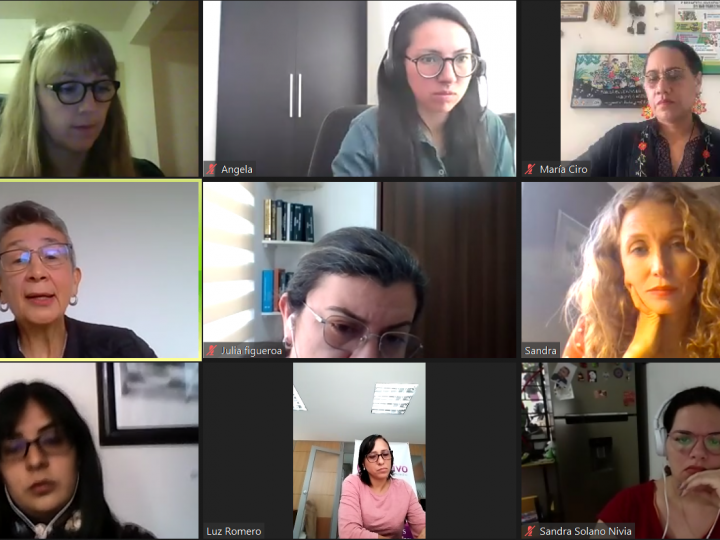During the panel "Not one step back: Women Take the Lead for Peace and Security in Colombia," they also reflected on the motivations and challenges they face in carrying out their work in Colombia. This activity was held in the framework of the Norwegian civil society week that commemorated 20 years of the United Nations Resolution 1325 on Women, Peace and Security.
The government of Colombia signed the Peace Accords with the FARC on September 26, 2016, with the historic participation of women, which was a great milestone in the struggle of women human rights defenders in this country. However, 42% of the commitments with a gender focus in the accords, are unstarted compared to 27% of general commitments that are unstarted, according to the Kroc Institute, the Women's International Democratic Federation (WIDF) and UN Women.
"Listening to all of them is to reaffirm the strength of the voice of women human rights defenders", affirmed Claudia Mejía, a reference in the defense of human rights in Colombia and who acted as moderator of this space. At the beginning of the conversation, the motivations that pushed the participants to become defenders were explored. Sandra Solano, from the organization 'Confluencia de Mujeres', highlighted that for her it was the need to "organize ourselves and continue our existence for all women in Colombia". Julia Figueroa, from the Luis Carlos Perez Lawyers Collective (Ccalcp), said: "I am the result of all those women who fought in the past. Now we are an example for others to build peace in Colombia. At this point, some recall a phrase of the black communities of Colombia: "I am because we are", to vindicate the importance of the struggle of women in the past to fan the fire of resistance and the defense of rights that motivates them today.
A long road ahead
In discussing the challenges ahead for women human rights defenders, all agreed on the need to fulfil the commitments made in the Peace Accords as soon as possible. But they also demanded not to lose sight of other issues. "The challenge] is protection. The measures are not sufficient to our needs," said Luz Romero of the Association of the Women's Right Collective (Asocolemad). This situation of lack of protection has worsened in recent months. According to the latest report from the Somos Defensores Program, homicides increased by 61% during the first half of the year compared to the same period in 2019. And in 3 out of 10 homicides the victims were women, according to the Information System on Aggressions against Human Rights Defenders in Colombia (SIADDHH).
Another key issue they highlighted was the recognition of identity. María Ciro, from the Social Integration Committee of Catatumbo (Cisca), explained that Afro-descendant, peasant, and indigenous identities "are being harshly attacked and are the object of genocide. He added that there will not be a complete peace until they are taken into account. To this end, Figueroa (Ccalcp) also recalled that Resolution 1325 is 20 years old, but "in Colombia it seems like it was signed yesterday" and stressed the possibility of integrating it with the Peace Accords to achieve coherence to the work they have been doing for many years.
Claudia Mejía also summarized other important challenges that were discussed, such as the fight against gender-based violence: "We need to overcome [gender-based violence] in the country in order to build peace from within and also to reduce impunity. In addition, she pointed out the importance of statistics that address women's realities, as well as "the need for a policy of care and the fight against corruption for the good management of resources.
The panelists were convinced of the importance of the international community accompanying civil society organizations in the path of building peace in Colombia. "Without this support, we would be more immersed in invisibility," said Maria Ortiz, from the Association of Victims for Peace and Development (Asvipad). This idea was echoed by Nancy Sánchez, a defender of the organization Tejedoras de Vida, who considered the role of the international community to be "key in putting pressure on the local and national government" as well as in increasing visibility on some issues, such as the resumption of aerial fumigation with glyphosate, an herbicide used to eradicate illicit crops but which kills the plants and legal crops it touches and "is probably carcinogenic," according to the International Agency for Research on Cancer.
"If we don't talk they kill us, if we talk too, then we better keep doing it. With these words, Nancy Sanchez sums up the determination of women defenders to continue denouncing human rights violations from their territories, as well as demanding effective compliance with the Colombian Peace Accords.
From the Norwegian Fund for Human Rights, we will continue to accompany women human rights defenders, recognizing their key role in building a stable and lasting peace in Colombia.

